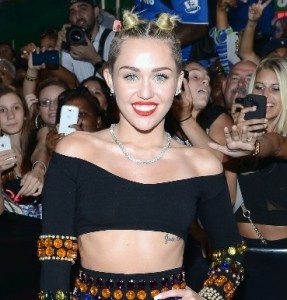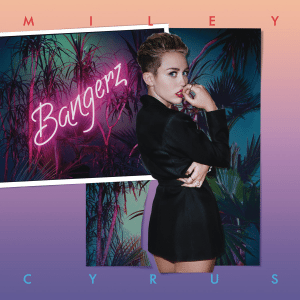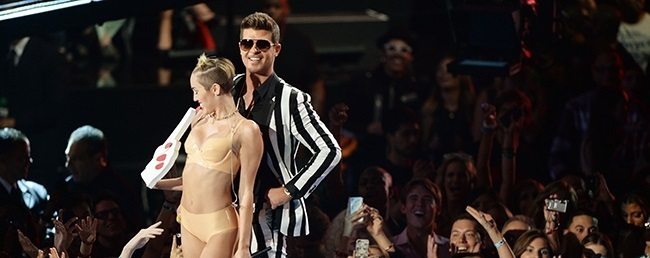Miley Cyrus: The Right to Twerk?
Unless you’ve spent the previous week buried beneath a rock, you will probably have seen Miley Cyrus’ infamous performance at the MTV Video Music Awards, or – at the very least – are aware of the backlash surrounding it. Cyrus’ routine – in which she performed her hit single ‘We Can’t Stop’ and appeared alongside Robin Thicke during a medley of ‘Blurred Lines’ and ‘Give it 2 U’ – has generated much media attention, and sparked the outrage of many, including America’s Parent Television Council.
While Cyrus’ performance was insulting in itself, denouncing the singer for wearing a flesh-coloured bikini and dancing “provocatively” would be wrong, and it speaks volumes about America’s current cultural values that a young woman’s body is more offensive than, say, gun crime. My own feelings regarding Cyrus’ performance can be divided into two groups: the aspects that I find sad or tragic, and those which I find insulting.
 Firstly, Cyrus – as a 20-year-old woman – has the absolute right to wear whatever she chooses, regardless of its garish or tacky qualities (here’s looking at you, teddy-bear leotard), simply because this is her right as an individual. Furthermore, we must remember that this is a performance; not only that, but a performance at the VMAs: one of America’s largest and most-viewed television events relating to the music industry, and one in which the aim of the game is to be as over-the-top and risqué as possible. Who could forget Madonna and Britney’s kiss in 2003, or Lady Gaga’s meat dress in 2010? One can hardly solely criticise Cyrus for being risqué when hundreds have done so before her.
Firstly, Cyrus – as a 20-year-old woman – has the absolute right to wear whatever she chooses, regardless of its garish or tacky qualities (here’s looking at you, teddy-bear leotard), simply because this is her right as an individual. Furthermore, we must remember that this is a performance; not only that, but a performance at the VMAs: one of America’s largest and most-viewed television events relating to the music industry, and one in which the aim of the game is to be as over-the-top and risqué as possible. Who could forget Madonna and Britney’s kiss in 2003, or Lady Gaga’s meat dress in 2010? One can hardly solely criticise Cyrus for being risqué when hundreds have done so before her.
However, while I cannot criticise Cyrus for her “suggestive” outfit, I do find it sad – not to mention a tragic indictment of the current state of the music industry – that she does have to stumble around while pawing her genitals with a foam finger to promote her music. Whatever one may think of her music, it is undeniable that Cyrus is talented. She has taken lead roles in four films, her own television show and three Top 10 albums, for crying out loud. Yet this is what she, along with many other contemporary female pop stars, must do to make her records sell.
On the other hand, there are numerous aspects of the onstage conduct itself which I do find insulting. First and foremost (apart from Thicke’s general presence), is that observers seem to be criticising Cyrus for grinding against a “married man”. Yet Thicke was hardly an unwilling participant in her posterior-wiggling, and as he has said himself in an article in GQ (in a way that is totally not creepy or rapey at all): “what a pleasure it is to degrade a woman”. Calling Cyrus a “slut” for dancing in a bikini with a man is one of the laziest, most ignorant insults there is.
 Perhaps even more offensive is Cyrus’ obliviousness (or even disregard) to the serious racial implications of her performance. Her attempt at “twerking” may stick in the teeth of many women of colour, as they view a skinny noodle of a girl wiggling her arse unconvincingly. But more serious still is her subjugation of the black women – transformed into literal human props as they were disguised by teddy-bear costumes – who danced with (or rather, for) her, thus substantiating Cyrus’ adoption of black culture as a means to be pervasive and controversial. In particular, as she slapped the bottom of a black woman, viewers were offered an insight into how Cyrus thinks women’s bodies (and in particular, those of black women) should be treated.
Perhaps even more offensive is Cyrus’ obliviousness (or even disregard) to the serious racial implications of her performance. Her attempt at “twerking” may stick in the teeth of many women of colour, as they view a skinny noodle of a girl wiggling her arse unconvincingly. But more serious still is her subjugation of the black women – transformed into literal human props as they were disguised by teddy-bear costumes – who danced with (or rather, for) her, thus substantiating Cyrus’ adoption of black culture as a means to be pervasive and controversial. In particular, as she slapped the bottom of a black woman, viewers were offered an insight into how Cyrus thinks women’s bodies (and in particular, those of black women) should be treated.
Cyrus’ behaviour reflects an increasing trend in the commercialisation of the music industry, using semi-naked young girls alongside product placement – such as Beats Audio in both Cyrus’ and Thicke’s music videos – to sell records. This “good girl gone bad” act which she has adopted allegedly seems like an attempt to rebel against her Disney background, but in fact, it is an excuse for record companies to cash in on the burgeoning sexuality of their young stars.
As much as Cyrus has been hounded by both women’s rights activists and parents groups alike, ultimately, she (along with her record label) is the victor. As both her singles ‘We Can’t Stop’ and ‘Wrecking Ball’ re-enter the iTunes US Top Ten, she seems to have proved – albeit rather cynically – that no publicity is bad publicity.
http://www.youtube.com/watch?v=i-xPYX9MABI

Comments